The Role of B Vitamins in Boosting Brain Power and Mental Focus
Introduction
When your brain feels foggy, tired, or unfocused, it’s not just about sleep or stress — it could be a nutrient problem. Specifically, a B vitamin deficiency can quietly drain your mental sharpness, slow your thinking, and dampen your mood. 🧠💭
The B-vitamin family — often called the “energy vitamins” — doesn’t just boost metabolism. These nutrients directly affect how your brain produces neurotransmitters, manages stress, and generates energy at the cellular level.
Let’s explore how each B vitamin supports your mental performance, the science behind their brain-boosting effects, how to supplement effectively, and how to pair them with breathwork and therapy for complete mental vitality. 🌿✨
Looking for supplements for Brain Fog? Click here.
🧬 Why Your Brain Loves B Vitamins
Your brain is the hungriest organ in your body — consuming nearly 20% of your total energy. But that energy depends on efficient nutrient conversion, neurotransmitter balance, and DNA repair — all powered by the B vitamin complex.
Without enough B vitamins, your neurons can’t communicate efficiently, leading to:
Fatigue and mental fog
Poor memory
Irritability or low mood
Slow reaction times
Stress sensitivity
Think of B vitamins as the spark plugs that keep your mental engine running smoothly. ⚙️
⚡ Meet the “Brain B Team”
There are eight essential B vitamins, each playing a unique role in brain metabolism, neurotransmission, and cellular protection.
| Vitamin | Key Function | Brain Benefit |
|---|---|---|
| B1 (Thiamine) | Converts glucose to energy | Supports memory and focus |
| B2 (Riboflavin) | Mitochondrial energy | Prevents fatigue |
| B3 (Niacin) | DNA repair, neurotransmitter synthesis | Supports mood balance |
| B5 (Pantothenic Acid) | Produces acetylcholine | Enhances learning and alertness |
| B6 (Pyridoxine) | Builds serotonin and dopamine | Supports motivation and calm |
| B7 (Biotin) | Glucose metabolism | Stable brain energy |
| B9 (Folate) | Creates new neurons | Enhances memory and mental clarity |
| B12 (Cobalamin) | Protects myelin sheath | Boosts focus, prevents brain shrinkage |
Each one is vital, but together, they form a synergistic network for brain optimization.
🧠 How B Vitamins Boost Brain Power
⚙️ They Power Cellular Energy
Every thought, emotion, or movement requires ATP (adenosine triphosphate). B vitamins — especially B1, B2, B3, and B5 — are key players in the Krebs cycle, converting food into brain energy.
🧬 They Build Neurotransmitters
B6, B9, and B12 work together to produce dopamine, serotonin, and GABA — chemicals that regulate focus, motivation, and mood.
Low B vitamins = low motivation and high irritability.
🧩 They Protect Neurons
B12 and folate maintain the myelin sheath, the protective coating around nerves. Without it, neuron signals slow, leading to cognitive decline and memory loss.
🛡️ They Reduce Homocysteine
Homocysteine is an amino acid that, when elevated, damages brain cells. B6, B9, and B12 convert it into harmless compounds, protecting against brain aging and Alzheimer’s disease.
🔬 What Science Says
Oxford University (2010): Older adults taking B6, B9, and B12 had 30% slower brain shrinkage and better memory.
American Journal of Clinical Nutrition (2013): Higher folate and B12 intake correlated with better cognitive function and less depression.
Harvard Health Review (2018): B-complex supplementation improved energy, mental clarity, and emotional stability in stressed adults.
💡 In short: B vitamins keep your neurons fueled, protected, and communicative.
🧩 Signs You Might Be Deficient
Even mild deficiencies can subtly impair cognition. Watch for:
Constant fatigue or “mental crash” by afternoon ⚡
Low motivation or concentration 🧠
Tingling hands/feet (possible B12 deficiency) ✋
Forgetfulness or word-finding issues 🧩
Mood swings, irritability, or anxiety 😟
Vegans, vegetarians, and older adults are especially at risk for B12 and folate deficiencies, as these are primarily found in animal products.
🌿 Best Food Sources of B Vitamins
| Vitamin | Food Sources |
|---|---|
| B1 (Thiamine) | Whole grains, lentils, sunflower seeds |
| B2 (Riboflavin) | Eggs, almonds, spinach |
| B3 (Niacin) | Chicken, tuna, peanuts |
| B5 (Pantothenic Acid) | Avocados, mushrooms, eggs |
| B6 (Pyridoxine) | Bananas, chickpeas, salmon |
| B7 (Biotin) | Nuts, sweet potatoes, eggs |
| B9 (Folate) | Leafy greens, citrus, legumes |
| B12 (Cobalamin) | Meat, fish, dairy, fortified cereals |
🍳 A balanced diet with these foods supports long-term cognitive health — but for many, supplementation is still essential.
💊 Supplementation: How to Use B Vitamins for Mental Focus
✅ Best Type:
Look for a B-complex supplement that contains active, methylated forms for better absorption:
Methylcobalamin (B12)
Pyridoxal-5-Phosphate (B6)
Methylfolate (B9)
🕓 When to Take:
Morning with breakfast — to fuel daytime energy.
Avoid at night, as B vitamins can be energizing.
Looking for supplements for Brain Fog? Click here.
💡 Dosage Guide (Daily Reference):
| Vitamin | Recommended Daily Amount |
|---|---|
| B1 | 1.1–1.2 mg |
| B2 | 1.1–1.3 mg |
| B3 | 14–16 mg |
| B5 | 5 mg |
| B6 | 1.3–2 mg |
| B7 | 30 mcg |
| B9 | 400 mcg |
| B12 | 2.4 mcg |
(Functional medicine practitioners often use slightly higher doses for cognitive optimization — consult a healthcare provider.)
⚙️ Synergy: How B Vitamins Work Together
You can’t isolate one B vitamin and expect miracles — they rely on each other.
Example:
B6 helps convert tryptophan → serotonin
B9 and B12 recycle homocysteine
B1 and B2 activate enzymes that produce ATP
That’s why a balanced B-complex is more effective than single vitamins.
🧬 B Vitamins and Neurotransmitters
Let’s go deeper:
| Neurotransmitter | Role | B Vitamins Involved |
|---|---|---|
| Dopamine | Motivation, reward | B6, B9, B12 |
| Serotonin | Calm, emotional balance | B6, B9 |
| Acetylcholine | Learning, memory | B5 |
| GABA | Relaxation, stress control | B6 |
When these are optimized, your brain chemistry feels balanced, creative, and focused.
🌬️ Breathwork: Oxygen + Nutrients = Brain Power
B vitamins provide chemical energy, while oxygen from breathing provides cellular fuel. Together, they turbocharge cognition.
Try the “Box Breathing” Technique:
Inhale through your nose for 4 seconds 🫁
Hold for 4 seconds
Exhale through your mouth for 4 seconds
Hold again for 4 seconds
Repeat for 3–5 minutes whenever you feel brain fog.
This simple exercise increases oxygen delivery to the brain and complements the energy you get from B vitamins.
🌬️ Nutrition fuels the neurons — breath fuels their fire.
Want to try Breathwork? Click Here.
🧘Therapy and Emotional Resilience
Therapy and B vitamins work on two sides of the same coin.
B vitamins regulate the neurochemical side of stress (cortisol, serotonin).
Therapy strengthens cognitive coping mechanisms and emotional awareness.
For example:
Low B6 or folate levels are linked with anxiety and depression.
Cognitive Behavioral Therapy (CBT) reduces rumination, allowing neurochemicals to stabilize.
🧩 When you nourish your brain and train your mind, emotional balance becomes easier to maintain.
Looking for online therapy ? Click Here.
⚡ How Stress Depletes B Vitamins

Stress consumes nutrients like a wildfire consumes oxygen. 🔥
Chronic stress increases cortisol, which in turn:
Accelerates the depletion of B6, B9, and B12.
Reduces absorption of nutrients from food.
Impairs mitochondrial efficiency.
That’s why people under chronic pressure (students, professionals, caregivers) often benefit most from B-complex supplementation.
🧘 Combine this with relaxation techniques (yoga, breathwork, journaling) to keep both mind and body balanced.
🧩 B Vitamins and Mental Health
There’s a strong link between B-vitamin status and mood disorders.
Key Research Highlights:
B6 deficiency: Associated with irritability, anxiety, and insomnia.
Low folate/B12: Common in individuals with depression.
Supplementation: Improves response to antidepressants in several studies.
Mechanism:
B vitamins boost the synthesis of serotonin and dopamine, restoring motivation and emotional balance.
🌿 Your brain’s happiness chemistry depends on its nutrient supply.
🧠 The Brain-Fog Connection
Low B-vitamin levels can mimic symptoms of ADHD or chronic fatigue.
This is because neurons literally can’t produce enough energy or neurotransmitters to keep up.
Restoring B vitamins often results in:
✅ Faster thinking
✅ Clearer recall
✅ Better mood regulation
✅ More consistent motivation
It’s one of the simplest — yet most overlooked — fixes for persistent brain fog.
🍽️ The “Brain-Boosting B Breakfast”
Start your day with a nutrient-packed meal that supports focus and mental clarity:
Example Meal:
2 eggs (B2, B12, B5)
Spinach and avocado (B9, B6, magnesium)
Whole-grain toast (B1, B3)
Cup of green tea (L-Theanine + calm focus)
Add your B-complex supplement here — it’ll absorb best with food. 🌞
🧩 Pairing B Vitamins with Other Supplements
For an even sharper mind, pair B vitamins with complementary nutrients:
| Supplement | Function | Synergy |
|---|---|---|
| Magnesium Glycinate | Calms nerves | Boosts B6 absorption |
| Omega-3 DHA/EPA | Supports neuron structure | Works with B12 and folate |
| CoQ10 | Enhances ATP production | Complements B2 and B3 |
| Rhodiola Rosea | Reduces stress | Preserves B vitamins under fatigue |
| Alpha-GPC | Increases acetylcholine | Works with B5 for focus |
These combinations amplify energy, clarity, and resilience — especially during high-demand work or study periods.
🧘 A Daily B-Vitamin Routine for Mental Focus

Stick with this routine for 4–6 weeks, and you’ll likely notice smoother concentration, brighter mood, and better recall.
🧬 Long-Term Brain Protection
B vitamins don’t just improve today’s focus — they protect your brain for years to come.
Folate and B12: Reduce neuroinflammation and preserve brain volume.
B2 and B3: Protect against oxidative stress.
B6: Supports restful sleep by converting tryptophan → melatonin.
Consistent intake supports neuroplasticity, keeping your mind adaptable and resilient even as you age.
⚠️ Safety and Side Effects
B vitamins are water-soluble, so excess amounts are excreted naturally.
They are safe for most people, but note:
Very high doses of B6 (>200 mg/day) may cause temporary tingling.
B3 (Niacin) in large doses can cause harmless flushing.
Always pair supplements with food to prevent nausea.
💧 Hydration helps flush excess water-soluble vitamins.
💡 Quick Recap
✅ B vitamins power brain metabolism, neurotransmitters, and protection.
✅ Deficiency = fatigue, fog, and low motivation.
✅ Take an active, methylated B-complex daily.
✅ Combine with oxygen (breathwork) and therapy for full-spectrum brain health.
✅ Long-term use supports focus, mood, and cognitive longevity.
🌟 Final Thoughts
B vitamins are the unsung heroes of mental performance. 💊
They don’t give you an instant “buzz” — they build a foundation of clarity and resilience, helping your brain produce energy efficiently, stay calm under pressure, and recover from stress faster.
When you combine B-complex supplementation with breathwork, balanced nutrition, and therapy, you’re giving your mind everything it needs to thrive.
✨ B vitamins don’t just fuel your body — they energize your mind. 🌿🧠
📚 References
Smith AD, et al. “Homocysteine-lowering by B vitamins slows brain atrophy.” Proc Natl Acad Sci USA. 2010;107(10):5171–5176.
Malouf R, et al. “Folic acid with or without vitamin B12 for cognition.” Cochrane Database Syst Rev. 2008;(4):CD004514.
Kennedy DO. “B vitamins and the brain: Mechanisms, dose and efficacy.” Nutrients. 2016;8(2):68.
Stough C, et al. “The neurocognitive effects of multivitamins containing B vitamins.” Hum Psychopharmacol. 2012;27(4):315–326.
Streeter CC, et al. “Breathwork and autonomic regulation.” J Altern Complement Med. 2012;18(5):402–412.
Related Posts
-
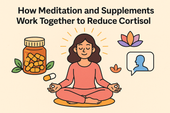
How Meditation and Supplements Work Together to Reduce Cortisol: A Complete Guide to Calming the Mind and Body
Meditation and supplements can work hand in hand to naturally reduce cortisol, your body’s main stress hormone. 🌿 Learn how mindfulness practices, adaptogenic herbs, and nutrient support like magnesium, omega-3s, and B vitamins create a powerful synergy for calm, focus, and emotional balance—backed by science and daily rituals that truly reset your stress response.
-
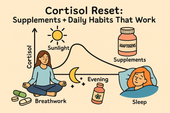
Cortisol Reset: Supplements + Daily Habits That Work
-
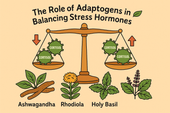
The Role of Adaptogens in Balancing Stress Hormones
Adaptogens work at the root of stress — your nervous system. 🌿 Learn how these powerful herbs help regulate cortisol, calm your nerves, and restore balance between energy and relaxation. ✨
-
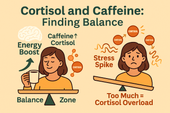
Cortisol and Caffeine: How Much Is Too Much?
Caffeine can boost energy and focus — but too much can overstimulate your stress hormones. ☕ Learn how caffeine affects cortisol, energy levels, and mood, and discover how to find the perfect balance for lasting calm and clarity. 🌿
-
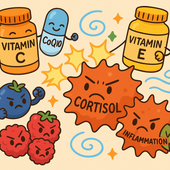
Antioxidants for Stress Management and Cortisol Control
When stress overwhelms your body, antioxidants come to the rescue. 🌿 Learn how vitamin C, CoQ10, and other natural compounds help reduce oxidative stress, regulate cortisol, and restore calm energy from within. ✨
-
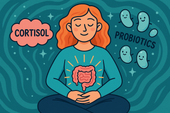
Cortisol and Gut Health: How Probiotics May Help
Chronic stress doesn’t just affect your mind — it changes your gut. 🌿 Learn how cortisol disrupts the microbiome and how probiotics can help restore balance, improve digestion, and calm your stress response naturally. ✨
-

Vitamin D and Cortisol: Supporting Immune Balance
Vitamin D does more than strengthen bones — it helps regulate cortisol and support immune balance. 🌞 Learn how this essential hormone-like nutrient restores calm, improves mood, and strengthens your body’s natural stress defenses. 🌿
-
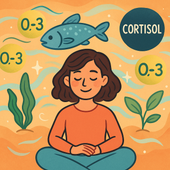
Omega-3s and Cortisol: Fighting Inflammation Naturally
Omega-3s are more than heart-healthy fats — they’re natural cortisol regulators. 🌿 Learn how EPA and DHA help reduce chronic inflammation, calm the nervous system, and support stress recovery from the inside out. ✨
-
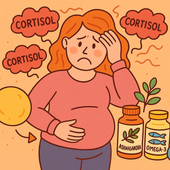
High Cortisol and Belly Fat: Can Supplements Help?
Chronic stress can make belly fat harder to lose — but supplements like ashwagandha, magnesium, and omega-3s may help restore cortisol balance. 🌿 Learn how science-backed nutrients support fat metabolism, calm your stress response, and bring your body back into harmony. ✨
-
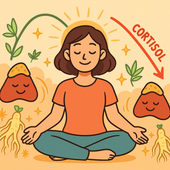
How Ginseng Can Support Energy and Cortisol Balance
Ginseng is one of nature’s most powerful adaptogens, helping your body handle stress without burning out. 🌿 Learn how this ancient root supports balanced cortisol, steady energy, and sharper focus — restoring vitality naturally and sustainably. ✨
-
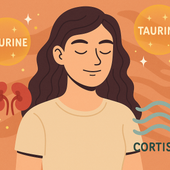
Taurine and Cortisol: Supporting Focus Under Stress
When cortisol surges, focus fades — but taurine helps restore balance. 🌿 Learn how this powerful amino acid calms your nervous system, regulates stress hormones, and sharpens concentration without jitters or fatigue. ✨
-
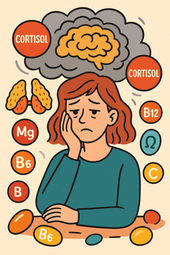
The Link Between Cortisol, Brain Fog, and Nutrient Deficiencies
When brain fog sets in, it’s not just in your head — it’s in your hormones. 🌿 Discover how cortisol imbalance and nutrient deficiencies like low magnesium, B vitamins, and omega-3s can cloud your focus and how restoring balance brings back mental clarity and calm. ✨
-
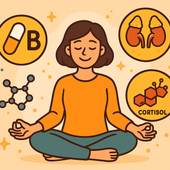
B Vitamins for Stress, Energy, and Cortisol Regulation
B vitamins are the foundation of stress resilience and steady energy. 🌿 Learn how this essential group of nutrients helps regulate cortisol, restore focus, and keep your nervous system calm — giving you balance from the inside out. ✨
-

Cortisol Imbalance and Chronic Fatigue: Can Supplements Help?
When chronic stress keeps cortisol high, fatigue and brain fog follow. 🌿 Learn how to rebalance your stress hormones naturally with calming nutrients, adaptogens, and lifestyle rituals that restore energy, focus, and inner peace. ✨
-

Adaptogen Stacks for Better Sleep and Lower Stress Hormones
Adaptogens can help your body recover from stress and sleep better by regulating key hormones like cortisol and adrenaline. 🌿 Learn how adaptogen stacks work to restore balance, calm the mind, and rebuild resilience — so you can rest deeply and wake renewed. ✨
-

Phosphatidylserine for Nighttime Cortisol Control
When stress hormones stay high at night, deep rest becomes impossible. 🌙 Discover how phosphatidylserine helps calm the brain, reduce nighttime cortisol, and restore healthy sleep rhythms — so you can wake up peaceful, clear, and recharged. ✨
-

Magnesium for Stress Relief and Cortisol Reduction
Magnesium is one of the most powerful natural tools for stress relief. 🌿 This essential mineral calms your nervous system, lowers cortisol, and helps your body recover from chronic tension. Learn how magnesium replenishes balance, improves sleep, and restores inner peace — naturally. ✨
-

Supplements to Improve Sleep by Balancing Cortisol
When cortisol stays high at night, sleep becomes a struggle. 🌙 Discover natural supplements that calm the nervous system, lower stress hormones, and restore your body’s natural rhythm. From magnesium and ashwagandha to L-theanine and phosphatidylserine, learn how to build deeper, more restorative rest. 🌿
-

Cortisol and Sleep: Why Stress Keeps You Awake
When stress keeps your body in fight-or-flight mode, cortisol refuses to calm down — and sleep becomes impossible. 🌙 Learn how elevated cortisol disrupts your circadian rhythm, suppresses melatonin, and turns restless nights into exhaustion. Discover how to restore balance and reclaim deep rest. ✨
-

L-Theanine for Cortisol Balance and Anxiety Relief
L-Theanine — the calming amino acid from green tea — helps quiet the mind and balance cortisol, the body’s key stress hormone. 🌿 Learn how it promotes calm focus, eases anxiety, and supports deep rest without sedation, backed by modern research and centuries of tradition. ✨
-

Rhodiola Rosea and Stress Resilience: A Natural Cortisol Regulator
Rhodiola rosea is one of nature’s most powerful tools for resilience. 🌿 This Arctic root helps balance cortisol, fight fatigue, and sharpen focus — keeping you calm yet energized even under stress. Discover the science behind Rhodiola’s adaptogenic power and how it helps your body thrive under pressure. ✨
-

Ashwagandha for Cortisol Balance: What the Science Says
Ashwagandha helps your body recover from chronic stress by calming the adrenal system and balancing cortisol — your key stress hormone. 🌿 Learn what science says about this powerful adaptogen, how it restores energy and focus, and why it’s one of nature’s most effective tools for modern stress relief. ✨
-

Supplements That Naturally Lower Cortisol Levels
When cortisol levels calm, your energy transforms — no more crashes or jitters, just steady focus and inner peace. 🌿 Learn which natural supplements and habits lower stress hormones, boost calm energy, and help your body thrive with balance instead of burnout. ✨
-

What Is Cortisol Imbalance? Symptoms You Shouldn’t Ignore
Cortisol — your body’s main stress hormone — keeps you alert and energized, but when it’s out of balance, it can drain your health. 🌿 Learn the signs of cortisol imbalance, from fatigue and anxiety to sleep disruption and stubborn weight gain, and discover how to restore calm, energy, and hormonal harmony naturally. ✨
-

The Best Daily Multivitamins for Menopausal Women
Menopause brings new nutritional needs that your old vitamin routine may no longer meet. 🌿 Discover how the right daily multivitamin can boost energy, balance mood, support bone and heart health, and keep your skin glowing. Learn which nutrients truly matter — from vitamin D to magnesium and B12 — to feel strong and vibrant every day. ✨
-

Antioxidants and Menopause: Fighting Inflammation Naturally
During menopause, oxidative stress and inflammation can quietly accelerate aging, fatigue, and skin changes. 🌿 Learn how antioxidants — from vitamins C and E to polyphenols in berries and green tea — help neutralize free radicals, reduce inflammation, and restore balance naturally. Discover the science of radiant, resilient aging. ✨
-

How CoQ10 Supports Heart Health After Menopause
After menopause, heart health becomes more important than ever. ❤️ Discover how CoQ10 — your body’s natural energy molecule — supports cardiovascular strength, restores vitality, and protects against oxidative stress. Learn how this essential nutrient helps keep your heart energized, balanced, and resilient through every stage of life. 🌿
-

Collagen Supplements for Skin and Joint Health Post-Menopause
After menopause, collagen loss affects both skin elasticity and joint comfort — but supplements can help rebuild from within. 🌸 Learn how collagen peptides, vitamin C, and other nutrients work together to restore firmness, reduce stiffness, and keep you glowing and mobile well into your next chapter. ✨
-

Calcium and Vitamin D: Protecting Bone Health in Menopause
Menopause brings hormonal changes that can weaken bones—but with the right nutrients, strength and stability can be rebuilt. 🦴 Learn how calcium and vitamin D work together to protect bone density, prevent fractures, and keep your body resilient. This guide explores nutrition, sunlight, and lifestyle habits that help your bones stay strong and vibrant for years to come. ☀️💪
-

Adaptogens for Energy and Resilience During Menopause
Feeling drained or emotionally scattered during menopause? 🌿 Discover how adaptogenic herbs like Ashwagandha, Rhodiola, and Ginseng can restore energy, balance cortisol, and build emotional resilience. Learn how these natural allies work with your body—not against it—to help you stay strong, focused, and calm through life’s hormonal changes. 🌸
-

Supplements That Help Beat Menopause Fatigue
Menopause fatigue can feel like more than tiredness—it’s a total energy crash. This guide explores how specific supplements, mindful breathwork, and therapy can help restore balance. Learn how nutrients like B vitamins, magnesium, and adaptogens rebuild your stamina, while breathwork and emotional healing calm your nervous system and bring vitality back to your days. 🌿✨
-

Herbal Blends for Menopausal Restlessness: Finding Calm in Transition
Herbal blends bring the wisdom of nature into moments of rest and renewal. Discover how soothing herbs like chamomile, lemon balm, and ashwagandha work together to calm menopausal restlessness, balance hormones, and invite deep relaxation. 🌿💫
-

Magnesium + Glycine for Deep Sleep During Menopause
Nutrients like magnesium, glycine, and B vitamins form the foundation for deep, restorative sleep during menopause. Discover how these natural compounds calm your nervous system, balance hormones, and help you wake up refreshed and recharged. 🌿💤
-

Melatonin and Menopause: Restoring Your Sleep Cycle
Nutrients are the foundation of hormone balance and energy. Learn how vitamins, minerals, and whole foods like greens, salmon, and berries nourish women’s bodies during menopause and beyond — restoring vitality, mood, and strength. 🌿🥗
-

How L-Theanine Helps With Menopausal Anxiety
Science continually deepens our understanding of the human body, from hormones to neurotransmitters. Discover how evidence-based research shapes modern wellness — bridging natural medicine, neuroscience, and hormone balance for healthier living. 🔬🌿
-

Can Ginkgo Biloba Improve Memory in Menopausal Women?
Hormone therapy can be a powerful tool for easing menopause symptoms and restoring balance. Learn how it works, the types available, and how to combine it safely with lifestyle and natural support for optimal well-being. 🌸💊
-

B Vitamins for Mental Clarity During Menopause
Nutrients are the foundation of mental and physical balance during menopause. Discover how vitamins, minerals, and whole foods like leafy greens, fish, nuts, and citrus can fuel energy, clarity, and calm while supporting hormonal health. 🌿✨
-

Mood Swings and Menopause: Natural Nutrient Support
Probiotics do more than support digestion — they help balance mood, hormones, and immunity too. Learn how a healthy gut microbiome can ease menopause symptoms, boost energy, and improve emotional resilience naturally. 🌿🦠
-

Brain Fog in Menopause: Supplements That May Help
Supplements can be powerful allies in restoring balance, energy, and focus—especially during menopause. Learn how nutrients like omega-3s, vitamin D, magnesium, and herbal adaptogens work together to support brain health, reduce stress, and promote lasting vitality. 🌿💊
-

Adaptogen Stacks for Reducing Night Sweats
Hormone detox isn’t about cleansing your body—it’s about restoring flow. Learn how the liver, gut, and endocrine systems work together to eliminate hormone buildup and how herbs like milk thistle, dandelion, and schisandra support balance, clarity, and natural vitality. 🌿💫
-

Cooling Menopause Symptoms with Herbal Support
Ashwagandha is one of nature’s most powerful adaptogens, helping women manage stress, sleep better, and balance hormones naturally. Discover how this ancient root supports calm energy, emotional resilience, and relief from menopause-related anxiety and fatigue. 🌿💫
-

Evening Primrose Oil and Menopause: What the Research Says
Hot flashes are one of the most common—and frustrating—symptoms of menopause. Discover what causes them, why the body’s “internal thermostat” becomes unbalanced, and the natural supplements and lifestyle shifts that can help you cool down, rest better, and feel more in control. 🔥💧
-

How Black Cohosh Helps with Menopausal Symptoms
Sleep disturbances are among the most exhausting symptoms of menopause—but they don’t have to rule your nights. Discover how natural strategies and calming supplements can help you fall asleep faster, stay asleep longer, and wake up feeling truly restored. 🌙💤
-

Natural Supplements That May Reduce Hot Flashes
Hot flashes can disrupt sleep, confidence, and daily comfort—but natural relief is possible. Discover the best research-backed supplements like black cohosh, red clover, and licorice root that may reduce hot flashes, balance hormones, and restore inner calm during menopause. 🌿💫
-

Omega-3s and Menopause: Supporting Mood and Inflammation
Omega-3 fatty acids are essential for hormonal harmony, brain function, and emotional balance—especially during menopause. Learn how these healthy fats reduce inflammation, support heart health, and restore calm, vitality, and focus through every stage of midlife. 🌊💫
-

The Role of Vitamin D in Menopausal Health
Vitamin D plays a powerful role in menopausal health—supporting bone strength, hormone balance, and mood stability. Discover how optimizing your vitamin D levels can improve sleep, energy, and emotional well-being while protecting long-term vitality through every stage of menopause. 🌞💪
-

Magnesium for Menopause: Relaxation, Sleep, and Hormonal Support
Self-regulation is the art of staying calm, centered, and in control—no matter what life throws your way. Learn how to strengthen emotional balance, manage stress responses, and cultivate inner peace through mindful techniques that reconnect your heart, body, and brain. 🌿💫
-

Can Adaptogens Like Ashwagandha Ease Menopausal Symptoms?
Brain fog during menopause can make even simple tasks feel overwhelming—but you’re not losing your sharpness, your hormones are simply shifting. Discover how adaptogens like ashwagandha and key nutrients can restore mental clarity, balance cortisol, and bring calm focus back to your day. 🌿🧠
-

Supplements That Support Hormonal Balance During Menopause
Herbal supplements have supported women’s health for centuries—and modern science is finally catching up. From ashwagandha and maca to red clover and rhodiola, discover how nature’s most trusted herbs can calm stress, balance hormones, and enhance energy through every life stage. 🌿✨
-

The Ultimate Motivation Stack: Supplements That Work Together
Discover how therapy helps restore motivation, focus, and emotional balance alongside supplement and mindset strategies. This empowering article explores how addressing thought patterns and emotional blocks through therapy can complement biochemical tools for long-term drive and well-being. 🧠💬


















































